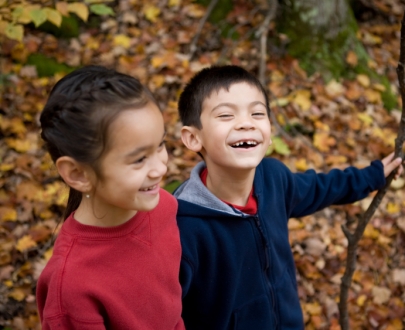
Spending time in nature is good for you[1]. Go outside with your child, or bring some nature indoors, and you will both feel happier and calmer. Spending time in nature can reduce stress and improve your mood. Nature can also help you be more alert and engaged. It is easier to pay attention and focus on tasks after contact with nature. A walk in nature has even been found to increase short-term memory.
5 Simple Ways to Bring More Nature into Your Life:
1. Go to the Park
Go to the park with your child. This is a great opportunity for your child to play outdoors, and you will both benefit from the outdoor time. Plus, you might even make some new friends.
2. Take the Scenic Route
Walk places instead of driving whenever possible: walk to school, walk to work, walk to the store. Make time to go for a walk in nature with your child. This a good opportunity to spend time together.
3. Take up Gardening
Start a garden in your yard or a potted garden on your balcony. If this is not an option for you, volunteer to help a friend with their garden. They will probably appreciate the extra help. Visit a community garden if there is one in your neighbourhood. Gardening is a great learning experience for your child and will bring you both closer to nature. Plus, it is fun!
4. Bring Nature Indoors
Make it possible to experience nature at home by getting some potted plants for your home. Encourage your child to help you water and care for the plants. This is another fun learning experience. If you live in an area with trees and plants outside, bringing in more nature might be as simple as opening the blinds.
5. Get out of the City
Have a family day on the weekend. Turn this into an opportunity for an outdoor adventure. Whether you travel somewhere or stay close to home, there are many ways to connect with nature. You could go for a hike, make a trip to the beach, go to a park, visit a farm, find a hill to climb or have a picnic lunch.
Memory & Mood
- Berman, M.G., Kross, E., Krpan, K. M., Mary K. Askren, M. K., Burson, A., Deldin, P. J., Kaplan, S., Sherdell, L., Gotlib, I. H., & Jonides, J. (2012). Interacting with nature improves cognition and affect for individuals with depression. Journal of Affective Disorders, 140, 300-305.
Stress & Attention
- Hartig, T., Evans, G. W., Jamner, L. D., Davis, D. S., & Gärling, T. (2003). Tracking restoration in natural and urban field settings. Journal of Environmental Psychology, 23, 109-123.
- Kaplan, S. (1995). The restorative benefits of nature: Toward an integrative framework. Journal of Environmental Psychology, 15, 169-182.
- Wells, N., & Evans, G. (2003). Nearby nature: A buffer of life stress among rural children. Environment and Behavior, 35, 311-330.
Physical & Emotional Development
- Louv, R. (2008). Last child in the woods: Saving our children from nature-deficit disorder. Chapel Hill, North Carolina: Algonquin Books of Chapel Hill.